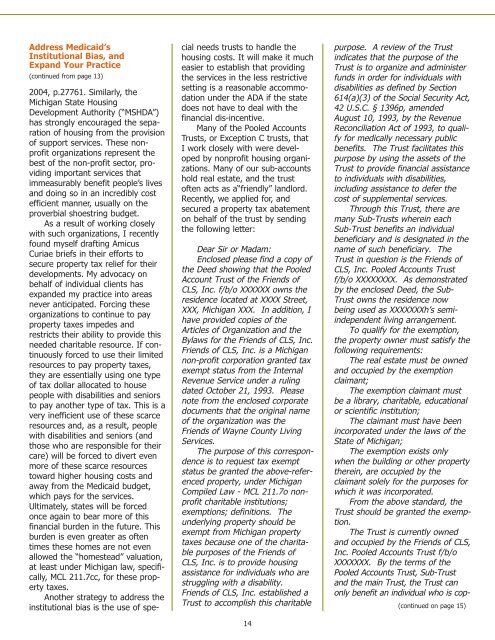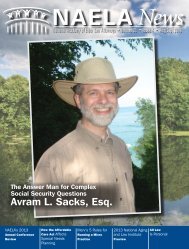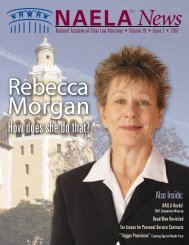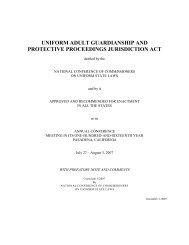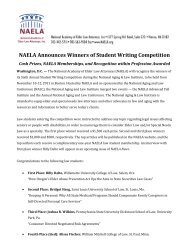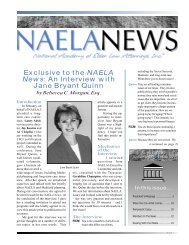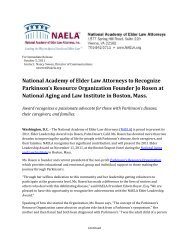N A E L A - National Academy of Elder Law Attorneys
N A E L A - National Academy of Elder Law Attorneys
N A E L A - National Academy of Elder Law Attorneys
You also want an ePaper? Increase the reach of your titles
YUMPU automatically turns print PDFs into web optimized ePapers that Google loves.
Contents<br />
Address Medicaid’s<br />
Institutional Bias, and<br />
Expand Your Practice<br />
(continued from page 13)<br />
2004, p.27761. Similarly, the<br />
Michigan State Housing<br />
Development Authority (“MSHDA”)<br />
has strongly encouraged the separation<br />
<strong>of</strong> housing from the provision<br />
<strong>of</strong> support services. These nonpr<strong>of</strong>it<br />
organizations represent the<br />
best <strong>of</strong> the non-pr<strong>of</strong>it sector, providing<br />
important services that<br />
immeasurably benefit people’s lives<br />
and doing so in an incredibly cost<br />
efficient manner, usually on the<br />
proverbial shoestring budget.<br />
As a result <strong>of</strong> working closely<br />
with such organizations, I recently<br />
found myself drafting Amicus<br />
Curiae briefs in their efforts to<br />
secure property tax relief for their<br />
developments. My advocacy on<br />
behalf <strong>of</strong> individual clients has<br />
expanded my practice into areas<br />
never anticipated. Forcing these<br />
organizations to continue to pay<br />
property taxes impedes and<br />
restricts their ability to provide this<br />
needed charitable resource. If continuously<br />
forced to use their limited<br />
resources to pay property taxes,<br />
they are essentially using one type<br />
<strong>of</strong> tax dollar allocated to house<br />
people with disabilities and seniors<br />
to pay another type <strong>of</strong> tax. This is a<br />
very inefficient use <strong>of</strong> these scarce<br />
resources and, as a result, people<br />
with disabilities and seniors (and<br />
those who are responsible for their<br />
care) will be forced to divert even<br />
more <strong>of</strong> these scarce resources<br />
toward higher housing costs and<br />
away from the Medicaid budget,<br />
which pays for the services.<br />
Ultimately, states will be forced<br />
once again to bear more <strong>of</strong> this<br />
financial burden in the future. This<br />
burden is even greater as <strong>of</strong>ten<br />
times these homes are not even<br />
allowed the “homestead” valuation,<br />
at least under Michigan law, specifically,<br />
MCL 211.7cc, for these property<br />
taxes.<br />
Another strategy to address the<br />
institutional bias is the use <strong>of</strong> special<br />
needs trusts to handle the<br />
housing costs. It will make it much<br />
easier to establish that providing<br />
the services in the less restrictive<br />
setting is a reasonable accommodation<br />
under the ADA if the state<br />
does not have to deal with the<br />
financial dis-incentive.<br />
Many <strong>of</strong> the Pooled Accounts<br />
Trusts, or Exception C trusts, that<br />
I work closely with were developed<br />
by nonpr<strong>of</strong>it housing organizations.<br />
Many <strong>of</strong> our sub-accounts<br />
hold real estate, and the trust<br />
<strong>of</strong>ten acts as a“friendly” landlord.<br />
Recently, we applied for, and<br />
secured a property tax abatement<br />
on behalf <strong>of</strong> the trust by sending<br />
the following letter:<br />
Dear Sir or Madam:<br />
Enclosed please find a copy <strong>of</strong><br />
the Deed showing that the Pooled<br />
Account Trust <strong>of</strong> the Friends <strong>of</strong><br />
CLS, Inc. f/b/o XXXXXX owns the<br />
residence located at XXXX Street,<br />
XXX, Michigan XXX. In addition, I<br />
have provided copies <strong>of</strong> the<br />
Articles <strong>of</strong> Organization and the<br />
Bylaws for the Friends <strong>of</strong> CLS, Inc.<br />
Friends <strong>of</strong> CLS, Inc. is a Michigan<br />
non-pr<strong>of</strong>it corporation granted tax<br />
exempt status from the Internal<br />
Revenue Service under a ruling<br />
dated October 21, 1993. Please<br />
note from the enclosed corporate<br />
documents that the original name<br />
<strong>of</strong> the organization was the<br />
Friends <strong>of</strong> Wayne County Living<br />
Services.<br />
The purpose <strong>of</strong> this correspondence<br />
is to request tax exempt<br />
status be granted the above-referenced<br />
property, under Michigan<br />
Compiled <strong>Law</strong> - MCL 211.7o nonpr<strong>of</strong>it<br />
charitable institutions;<br />
exemptions; definitions. The<br />
underlying property should be<br />
exempt from Michigan property<br />
taxes because one <strong>of</strong> the charitable<br />
purposes <strong>of</strong> the Friends <strong>of</strong><br />
CLS, Inc. is to provide housing<br />
assistance for individuals who are<br />
struggling with a disability.<br />
Friends <strong>of</strong> CLS, Inc. established a<br />
Trust to accomplish this charitable<br />
purpose. A review <strong>of</strong> the Trust<br />
indicates that the purpose <strong>of</strong> the<br />
Trust is to organize and administer<br />
funds in order for individuals with<br />
disabilities as defined by Section<br />
614(a)(3) <strong>of</strong> the Social Security Act,<br />
42 U.S.C. § 1396p, amended<br />
August 10, 1993, by the Revenue<br />
Reconciliation Act <strong>of</strong> 1993, to qualify<br />
for medically necessary public<br />
benefits. The Trust facilitates this<br />
purpose by using the assets <strong>of</strong> the<br />
Trust to provide financial assistance<br />
to individuals with disabilities,<br />
including assistance to defer the<br />
cost <strong>of</strong> supplemental services.<br />
Through this Trust, there are<br />
many Sub-Trusts wherein each<br />
Sub-Trust benefits an individual<br />
beneficiary and is designated in the<br />
name <strong>of</strong> such beneficiary. The<br />
Trust in question is the Friends <strong>of</strong><br />
CLS, Inc. Pooled Accounts Trust<br />
f/b/o XXXXXXXX. As demonstrated<br />
by the enclosed Deed, the Sub-<br />
Trust owns the residence now<br />
being used as XXXXXXXh’s semiindependent<br />
living arrangement.<br />
To qualify for the exemption,<br />
the property owner must satisfy the<br />
following requirements:<br />
The real estate must be owned<br />
and occupied by the exemption<br />
claimant;<br />
The exemption claimant must<br />
be a library, charitable, educational<br />
or scientific institution;<br />
The claimant must have been<br />
incorporated under the laws <strong>of</strong> the<br />
State <strong>of</strong> Michigan;<br />
The exemption exists only<br />
when the building or other property<br />
therein, are occupied by the<br />
claimant solely for the purposes for<br />
which it was incorporated.<br />
From the above standard, the<br />
Trust should be granted the exemption.<br />
The Trust is currently owned<br />
and occupied by the Friends <strong>of</strong> CLS,<br />
Inc. Pooled Accounts Trust f/b/o<br />
XXXXXXX. By the terms <strong>of</strong> the<br />
Pooled Accounts Trust, Sub-Trust<br />
and the main Trust, the Trust can<br />
only benefit an individual who is cop-<br />
(continued on page 15)<br />
14


